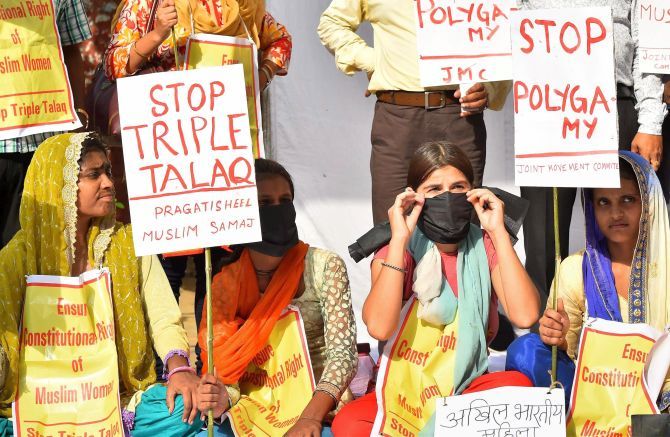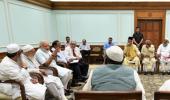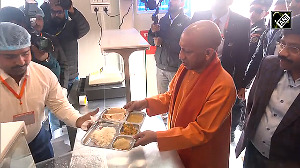The Supreme Court will commence hearing from Thursday on a batch of pleas challenging the constitutional validity of 'triple talaq', 'nikah halala' and polygamy practices among Muslims.

A five-judge Constitution bench headed by Chief Justice J Khehar will commence hearing on seven petitions, including five separate writ petitions filed by Muslim women challenging the practice of triple talaq prevalent in the community and terming it unconstitutional.
The bench, also comprising Justices Kurian Joseph, R F Nariman, U U Lalit and Abdul Nazeer, will also take up the main matter on its own as a petition titled "Muslim Women's quest for equality".
The members of the bench are from different religious communities including Sikh, Christian, Parsee, Hindu and Muslim.
The hearing assumes significance as the apex court has decided to hear the case during the summer vacation and even suggested that it is likely to sit on Saturdays and Sundays to expeditiously decide the contentious and sensitive issues arising in the matter.
Attorney General Mukul Rohatgi will assist the bench which will also examine to what extent the court can interfere in the Muslim personal laws if they are found to be violative of the fundamental rights of citizens enshrined in the Constitution.
The apex court had on its own taken cognizance of the question whether Muslim women faced gender discrimination in the event of divorce or due to other marriages of their husbands.
The top court will examine the issue to give an authoritative pronouncement on the constitutional and legal validity of 'triple talaq', 'nikah halala' and polygamy practices among Muslims.
The hearing holds importance as the Allahabad high court in its verdict pronounced in the last week of April, had held the practice of triple talaq as unilateral and bad in law.
The high court verdict had come while dismissing a petition filed by one Aaqil Jamil whose wife had filed a criminal complaint against him alleging that he had tortured her for dowry and when his demands were not met, he gave her triple talaq.
The copy of high court verdict was made available only on Tuesday.
The apex court had on March 30 said that the Muslim practices of triple talaq, nikah halala and polygamy are issues that are "very important" and involve "sentiments" and a constitution bench would hear the petitions from May 11.
Influential Muslim organisations like the All India Muslim Personal Law Board have opposed court's adjudication of these matters, maintaining these practices stemmed from the Holy Quran and were not justiciable.
The Muslim women who have filed the petitions have challenged the practice of triple talaq in which the husband, quite often, pronounces talaq thrice in one go, sometimes even by phone or text message.
On other hand, Nikah Halala is a practice intended to curb the incidence of divorce under which a man cannot remarry his former wife without her having to go through the process of marrying someone else, consummating it, getting divorced, observing the separation period called 'Iddat' and then coming back to him again.
The apex court while referring to the matter to a larger bench had observed that "sentiments" were involved in the matter pending before it and a five-judge constitution bench would adjudicate the issue, which required a detailed hearing.
The apex court had earlier said it would decide issues pertaining to the legal aspects of the practices of triple talaq, nikah halala and polygamy among Muslims, but would not deal with the question whether divorce under Muslim law needs to be supervised by courts as it fell under the legislative domain.
The Centre had on October 7 last opposed in the Supreme Court the practice of triple talaq, nikah halala and polygamy among Muslims and favoured a relook on grounds like gender equality and secularism.
On March 27, the All India Muslim Personal Law Board had told the apex court that pleas challenging such practices among Muslims were not maintainable as the issues fell outside the realm of judiciary.
The board had also said the validity of the Mohammedan Law, founded essentially in the Holy Quran and sources based on it, cannot be tested on the particular provisions of the Constitution.
It had said there was a need for "judicial restraint" before going into constitutional interpretation of these unless such an exercise becomes unavoidable.
The ministry of law and justice, in its affidavit, had referred to constitutional principles like gender equality, secularism, international covenants, religious practices and marital law prevalent in various Islamic countries to drive home the point that the practice of triple talaq and polygamy needed to be adjudicated upon afresh by the apex court.
IMAGE: Activists of Joint Movement Committee protest on the issue of triple talaq at Jantar Mantar in New Delhi. Photograph: Kamal Singh/PTI Photo











 © 2025
© 2025